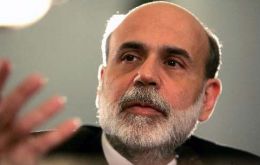MercoPress. South Atlantic News Agency
Economy
-
Friday, March 7th 2008 - 21:00 UTC
Record peak of US home foreclosures in fourth quarter 2007
The number of US home foreclosures, and the rate of homes entering the process, reached record highs in the fourth quarter of 2007, according to the US Mortgage Bankers Association.
-
Friday, March 7th 2008 - 21:00 UTC
EU 9 million Euros, in 6 years, funding for Gibraltar
Gibraltar will benefit from over 9 million Euros in EU funding over the next six years to invest in projects aimed at fostering sustainable and diversified economic growth reports the Gibraltar Chronicle.
-
Friday, March 7th 2008 - 21:00 UTC
Brazilian officials optimistic in spite of US recession
Brazil economy grew more than 5% in 2007 on high global demand for agricultural products, ethanol and iron ore and a booming domestic market, Finance Minister Guido Mantega said Friday in a press conference.
-
Friday, March 7th 2008 - 21:00 UTC
Virulent wheat fungus spreading in Asian grain areas says FAO
The United Nations food agency has asked wheat-producing nations in Asia, including India and Pakistan to be on high alert following a report that a new virulent wheat fungus has moved to major wheat-growing areas in Iran.
-
Friday, March 7th 2008 - 21:00 UTC
Fertilizer production expected to outstrip demand says FAO
World fertilizer production is expected to outstrip demand over the next five years and will support higher levels of food and bio-fuel production, FAO said in a new report entitled “Current world fertilizer trends and outlook to 2011/12”, published this week.
-
Friday, March 7th 2008 - 21:00 UTC
Spanish real estate boom funded by black money claims US

The United States State Department 2008 International Narcotics Control Strategy Report makes a link and describes Spain as the “grand European centre for money laundering”, according to the Gibraltar Chronicle.
-
Thursday, March 6th 2008 - 21:00 UTC
Colombian assessing impact of trade loss with neighbors
Colombia is assessing the economic impact of the current diplomatic conflict with Ecuador and Venezuela which represented 9 billion US dollars in trade last year and a significant boost for the country's economic expansion.
-
Thursday, March 6th 2008 - 21:00 UTC
Hard times for some of Europe's leading financial institutions
Some of Europe's leading banks are also facing problems as a consequence of the downfall from the US credit crisis and for having possibly breached US rules banning banks from doing business with countries on a terrorist blacklist.
France's biggest retail bank Credit Agricole made a loss in the last three months of 2007, hit by a hefty charge at its Calyon investment banking arm. -
Thursday, March 6th 2008 - 21:00 UTC
Euro zone and UK leave interest rates unchanged

The European Central Bank (ECB) kept interest rates unchanged at 4% on Thursday as concerns about inflation persist. Earlier in London the Bank of England's Monetary Policy Committee adopted a similar decision keeping interest rates on hold at 5.25%.
-
Wednesday, March 5th 2008 - 21:00 UTC
Bernanke calls on bankers to prevent rise in foreclosures

The chairman of the US Federal Reserve, Ben Bernanke, has said more should be done to prevent homeowners facing foreclosures unnecessarily. Bernanke warned there had been a 50% rise in foreclosures in 2007 to one and a half million, and this is expected to worsen as mortgage repayments rise.
The Fed chairman told a meeting of US bankers that the situation called for a “vigorous response”. This would help communities and the wider economy, he said.
